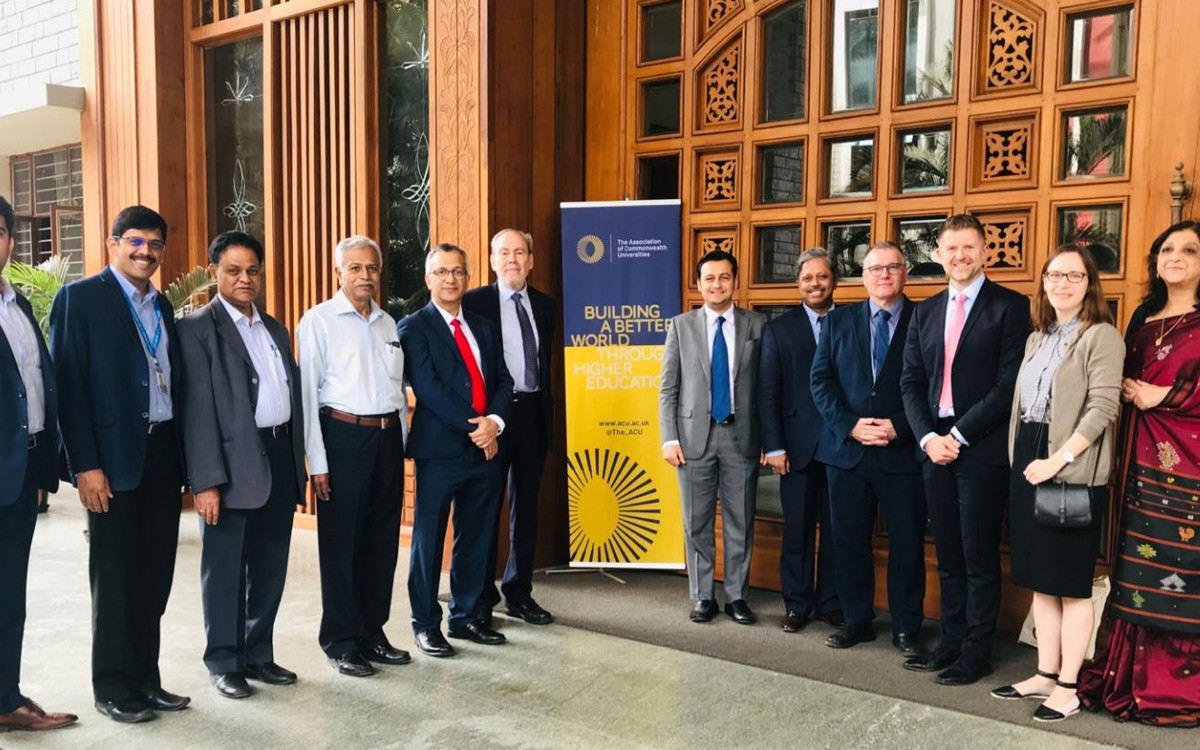ACU members from India and the UK convened to discuss the advantages of blended learning as a solution to teaching shortages.


Aditya Malkani
Regional Director
From 24-27 February 2020, the ACU brought together members from India and the UK to discuss the faculty issues affecting Indian universities at three forums. Taking place at Christ University in Bangalore, National Law University in New Delhi, and the University of Mumbai in Mumbai, the forums addressed what the ACU can do to support the development of sustainable solutions in response to teaching shortages. Central to this discussion was how blended learning – an approach which combines technology and digital media to deliver teaching virtually – can help ACU members increase their teaching capacity.
The need to build capacity within higher education has never been so important. As a result of COVID-19 and social distancing measures, more and more universities are turning to digital learning to educate their students virtually. By eradicating the need for physical, face-to-face contact, blended learning enables teaching staff to reach their students at a time in which the physical doors of classrooms and lecture halls are closed to them. Solutions such as blended learning, therefore, speaks not only to ongoing teaching shortages, but also to the immediate reality currently facing universities across the world.
The forums touched upon blended learning as part of a wider discussion on teaching shortages across private and public sectors in India. To date, the ACU has over 150 member universities in India. ACU membership across India is not only large but also diverse - including central, state, private, and deemed universities across both urban and rural regions of North, South, East and West India. Attended by 40 participants from 20 ACU member universities, the forums provided a space for academic staff to offer insights, exchange experiences, and discuss practical solutions to faculty shortages and the need for faculty development.
Discussions took place in a ‘round-table’ format, and saw participation from universities across eight Indian states - as well as three UK institutions who were specially invited to share their perspectives. Attendees discussed the accessible tools needed to address these teaching shortages and how best to address gaps in teaching quality. It was observed that teaching shortages are often seen by institutions outside the major cities - where it was felt that more conducive ecosystems are needed to attract and retain a strong faculty. Above all, it was unanimously felt that challenges exist in the quality of teaching and capacity building across public and private institutions. There were active calls for the ACU to develop faculty development programmes through interactive and face-to-face methods to overcome these challenges.
UK members, Professor Martin Dyke, Head of Southampton Education School and Professor Sabu Padmadas, Associate Dean (International) of the of Social Sciences at the University of Southampton; Professor Stanton Newman, Vice President International at City University of London; Dr Steven Truxal, Associate Dean International at The City Law School; and Amrita Sadarangani, Regional Director – South East Asia, from the University of Edinburgh, shared their views and showcased the ways their universities apply blended learning to build capacity and resilience.
These methods included live and pre-recorded lectures, online assessments, weekly discussion forums, e-books and online resources. The students found these methods to be both interactive and engaging, while the universities found that they were able to deliver courses online without much financial investment.
The ACU’s experience in supporting universities transition to virtual learning is significant. ACU's South Asia Representative, Aditya Malkani, presented on the ACU’s Partnership for Enhanced and Blended learning (PEBL), which addresses critical academic faculty shortages in East Africa. PEBL enables universities to share scarce teaching resources through quality assured credit-bearing degree courses delivered through blended learning. The programme allows participating universities to expand the range of courses offered to students, ease the teaching burden placed on staff, and grow their educational development capacities.
Whilst the response to PEBL from the Indian members was extremely positive, a number of participants identified a need for a programme to help their faculty develop the skills and confidence to use online blended learning methods. It was cited that ‘changing the mindset’ of the more traditional academics may present a challenge for some institutions.
Participants exchanged a range of useful solutions to help support staff development. These included a mentoring platform to help faculty in India act as both mentors and mentees through a virtual learning network (VLE), with a focus on tackling pedagogical issues; an ‘India Action Framework’ to build solutions tailored to the context-specific needs of Indian universities; and lastly, for the ACU to collate information on the different motivations for the use of online learning - to account for the fact that different universities foster different needs and objectives.
The global pandemic shifts the need for virtual learning into central focus worldwide. The onus is now on universities to adopt effective alternatives to physical, face-to-face teaching methods. By harnessing digital media to deliver courses virtually, blending learning equips universities with the means to both respond to teaching shortages and safeguard their community from unexpected circumstances.
With the stewardship of apex bodies of Higher Education such as the Association of Indian Universities (AIU) and the University Grants Commission (UGC), the ACU will be using the relevant ideas and intelligence raised at these forums to design an effective, capacity building framework that can support the needs of our Indian members to help build capacity at their institutions.
